Lulach mac Gille Coemgáin was King of Alba (Scotland) between 15 August 1057 and 17 March 1058.
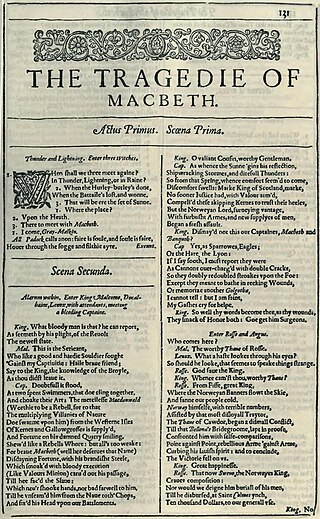
Macbeth is a tragedy by William Shakespeare. It is thought to have been first performed in 1606. It dramatises the damaging physical and psychological effects of political ambition on those who seek power. Of all the plays that Shakespeare wrote during the reign of James I, Macbeth most clearly reflects his relationship with King James, patron of Shakespeare's acting company. It was first published in the Folio of 1623, possibly from a prompt book, and is Shakespeare's shortest tragedy.
Macbethad mac Findláech, nicknamed the Red King, was King of Scotland (Alba) from 1040 until his death. Little is known about Macbeth's early life, although he was the son of Findláech of Moray and may have been a grandson of Malcolm II. He became Mormaer (Earl) of Moray – a semi-autonomous province – in 1032, and was probably responsible for the death of the previous mormaer, Gille Coemgáin. He subsequently married Gille Coemgáin's widow, Gruoch, but they had no children together.

Lord Macduff, the Thane of Fife, is a character and the main antagonist in William Shakespeare's Macbeth (c.1603–1607) that is loosely based on history. Macduff, a legendary hero, plays a pivotal role in the play: he suspects Macbeth of regicide and eventually kills Macbeth in the final act. He can be seen as the avenging hero who helps save Scotland from Macbeth's tyranny in the play.
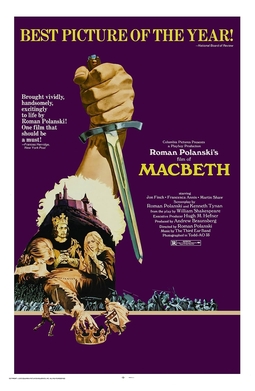
Macbeth is a 1971 historical drama film directed by Roman Polanski, and co-written by Polanski and Kenneth Tynan. A film adaptation of William Shakespeare's tragedy of the same name, it tells the story of the Highland lord who becomes King of Scotland through treachery and murder. Jon Finch and Francesca Annis star as the title character and his wife, noted for their relative youth as actors. Themes of historic recurrence, greater pessimism and internal ugliness in physically beautiful characters are added to Shakespeare's story of moral decline, which is presented in a more realistic style.

Dunsinane Hill is a hill of the Sidlaws near the village of Collace in Perthshire, Scotland. It is mentioned in Shakespeare's play Macbeth, in which a vision informs Macbeth that he "shall never vanquished be, until Great Birnam wood to high Dunsinane hill Shall come against him."
Samantha Jane Bond is an English actress. She played Miss Moneypenny in four James Bond films during the Pierce Brosnan era, and appeared in Downton Abbey as the wealthy widow Lady Rosamund Painswick, sister of Robert Crawley, the Earl of Grantham. On television, she played "Auntie Angela" in the sitcom Outnumbered and the villain Mrs Wormwood in the CBBC Doctor Who spin-off, The Sarah Jane Adventures. She also originated the role of "Miz Liz" Probert in the Rumpole of the Bailey series. She is a member of the Royal Shakespeare Company.

Tamsin Margaret Mary Greig is a British actress and narrator. She is known for both dramatic and comedic roles. She played Fran Katzenjammer in the Channel 4 sitcom Black Books, Dr Caroline Todd in the Channel 4 sitcom Green Wing, Beverly Lincoln in British-American sitcom Episodes and Jackie Goodman in the Channel 4 sitcom Friday Night Dinner. Other roles include Alice Chenery in BBC One's comedy-drama series Love Soup, Debbie Aldridge in BBC Radio 4's soap opera The Archers, Miss Bates in the 2009 BBC version of Jane Austen's Emma, and Beth Hardiment in the 2010 film version of Tamara Drewe. In 2020, Greig starred as Anne Trenchard in Julian Fellowes' ITV series Belgravia.

Gruoch ingen Boite was a Scottish queen, the daughter of Boite mac Cináeda, son of Cináed II. She is most famous for being the wife and queen of MacBethad mac Findlaích (Macbeth), as well as being the inspiration behind Lady Macbeth in Shakespeare's Macbeth. The dates of her life are uncertain.

Macbeth is a 1948 American historical drama directed by Orson Welles. A film adaptation of William Shakespeare's tragedy of the same name, it tells the story of the Scottish general who becomes the King of Scotland through treachery and murder. The film stars Welles in the lead role and Jeanette Nolan as Lady Macbeth.
Niamh Cusack is an Irish actress. Born to a family with deep roots in the performing arts, Cusack has been involved as a performer since a young age. She has served with the UK's two leading theatre companies, the Royal Shakespeare Company and the Royal National Theatre and has performed in a long line of major stage productions since the mid-1980s. She has made numerous appearances on television including a long-running role as Dr. Kate Rowan in the UK series Heartbeat (1992–1995) which made her a household name and favourite. She has often worked as a voice actress on radio, and her film credits include a starring role in In Love with Alma Cogan (2011).
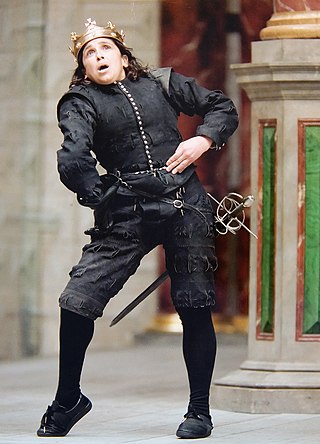
Aikaterini Hadjipateras, known professionally as Kathryn Hunter, is a British—American actress and theatre director, known for her appearances as Arabella Figg in the Harry Potter film series, Eedy Karn in the Disney+ Star Wars spinoff series Andor, and as the Three Witches in Joel Coen’s The Tragedy of Macbeth.

Macbeth is a 2006 Australian adaptation of William Shakespeare's Macbeth. It was directed by Geoffrey Wright and features an ensemble cast led by Sam Worthington in the title role. Macbeth, filmed in Melbourne and Victoria, was released in Australia on 21 September 2006.
David Greig is a Scottish playwright and theatre director. His work has been performed at many of the major theatres in Britain, including the Traverse Theatre, Royal Court Theatre, Royal National Theatre, Royal Lyceum Theatre and the Royal Shakespeare Company, and been produced around the world.
Madeleine Worrall is a Scottish actress. She has worked extensively on stage, in London and across Britain.
Darrell Fitzgerald D'Silva is a British film and theatre actor, notable for his work with the Royal Shakespeare Company.
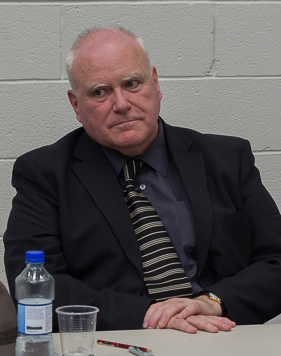
Ronald Eaglesham Porter, known professionally as Ron Donachie, is a Scottish actor. He is known for starring as DI John Rebus in the BBC Radio 4 dramatisations of the Ian Rankin "Rebus" detective novels and for his supporting roles in films The Jungle Book (1994), Titanic and television series Doctor Who and Game of Thrones.
Young Siward is a character in William Shakespeare’s play Macbeth (1606). He is the son of Siward, general of the English forces in the battle against Macbeth. Macbeth kills him in the final battle, shortly before his swordfight with Lord Macduff.
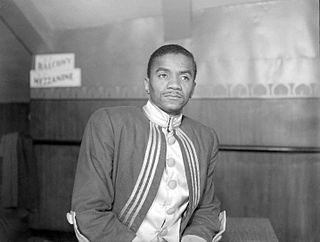
Malcolm is a character in William Shakespeare's Macbeth. The character is based on the historical king Malcolm III of Scotland, and is derived largely from the account in Holinshed's Chronicles (1587), a history of Britain. He is the elder son of King Duncan, the heir to the throne, and brother to Donalbain. In the end, he regains the throne after mustering support to overthrow Macbeth.

The Battle of Dunsinane, also known as the Battle of the Seven Sleepers, was fought between the forces of Macbeth, King of Scotland and forces led by Siward, Earl of Northumbria and Malcolm Canmore on 27 July 1054. The battle was part of a campaign launched by Siward in support of Malcolm's claim to the Scottish throne, which Macbeth had gained after killing Malcolm's father, Duncan I of Scotland, at the Battle of Pitgaveny in 1040. Ending in victory for Siward and Malcolm the battle of Dunsinane was fought in Perthshire, traditionally on Dunsinane Hill.











